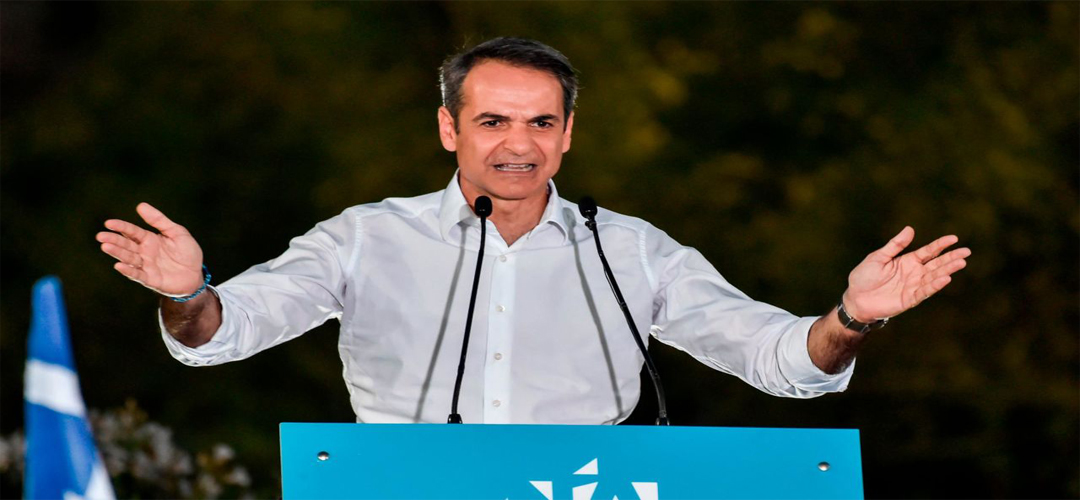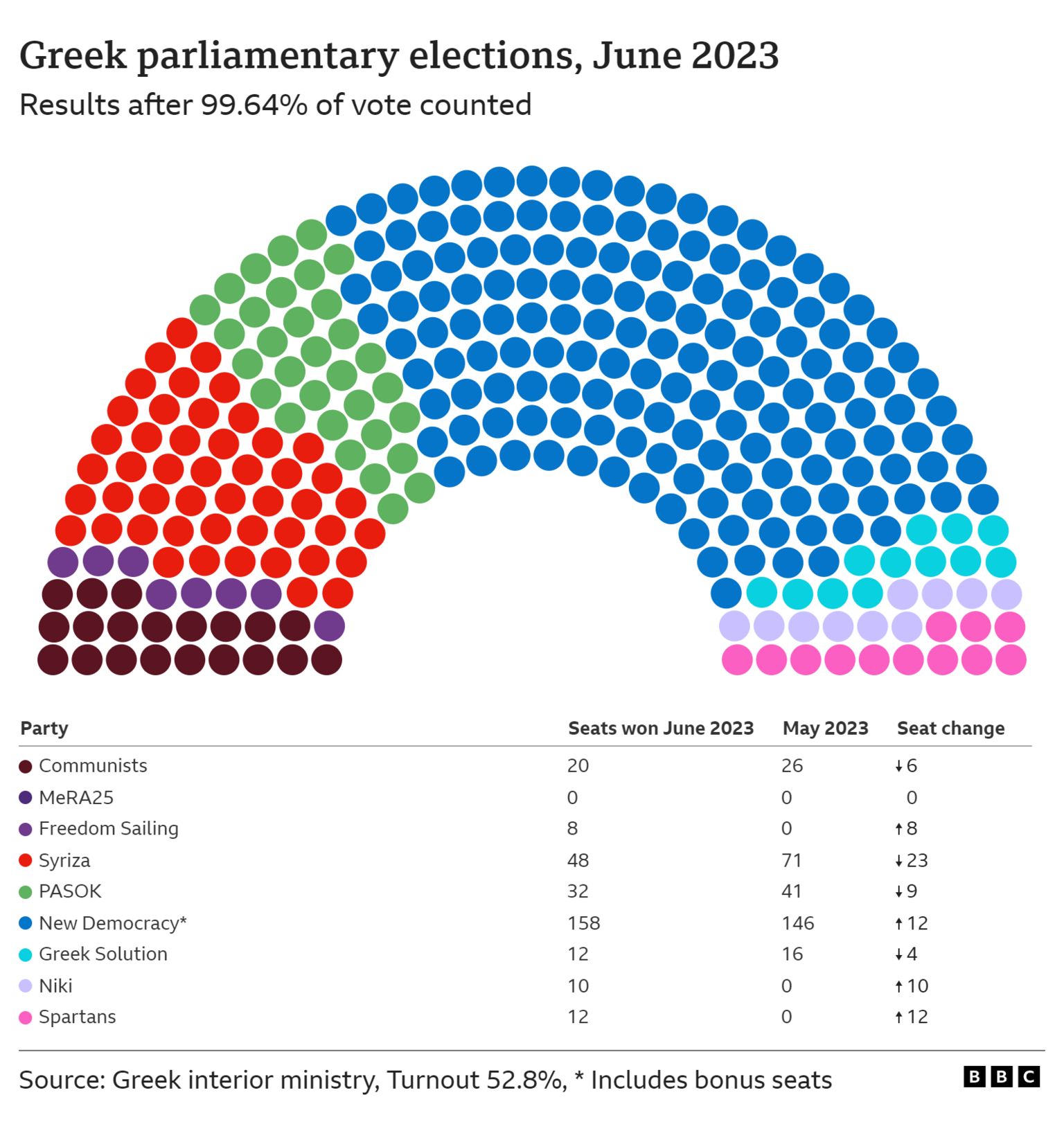Greece Elections 2023: Turning the Tide?
July 8, 2023 | Expert Insights

Prime Minister Kyriakos Mitsotakis's centre-right New Democracy party won a landslide victory in Greece's recent election, securing a second term in office. Greece held snap elections on June 25, 2023, following inconclusive results in the May 21 election.
The New Democracy won 40.8 per cent of the vote, giving it a majority in parliament. The leftist Syriza party, led by Alexis Tsipras, trailed behind with 20.7 per cent of the vote.
Background
The election results have significant implications for the Greek economy and politics. On the economic front, continuing the current dispensation in power is seen as a positive development by investors. Mr Mitsotakis is a pro-business leader who has pledged to continue the reforms that have helped to stabilize the Greek economy in recent years. He has also promised to reduce the country's debt burden and attract foreign investment.
The Greek economy is growing at twice the eurozone average, and foreign direct investment has increased by 50 per cent in the past year. After three bailouts totalling €280 billion, international supervision of spending controls by lenders was finally ended last summer.
Mr Mitsotakis's government spent over 57 billion euros ($62 billion) to cushion the impact of the health crisis and inflation. This was made possible by the EU's more relaxed pandemic-era rules, which gave Greece more leeway to spend. He has also played up Greece's newfound economic health in his re-election bid. He has said that his conservatives have cut 50 taxes while increasing national output by 29 billion euros and overseeing the largest infrastructure upgrades since 1975.
This message appeared to have gone down well with voters weary of Greece's debt years awash with job losses, rising payments and companies going bankrupt. Voters were clearly looking for a change, and Mitsotakis's message of economic recovery resonated with them.
Mitsotakis's small-state, tax-cutting platform was also combined with ruthlessly populist policies on migration, including a Trumpian pledge to extend a steel border fence along almost the entire length of Greece's border with Turkey, its historical adversary and a gateway for illegal immigrants heading for Europe.

Analysis
Prime Minister Mitsotakis's populist policies went well with most voters but were also controversial. For example, his pledge to extend a steel border fence along almost the entire length of Greece's border with Turkey to deter illegal immigration came under criticism for being expensive, ineffective and discriminatory. Critics maintained that while no fence can totally stop determined migrants desperate enough to brave all dangers and surmount all obstacles, it would definitely contribute to isolating Greece from its neighbours. Another argument was its discriminatory nature, as it would unfairly target refugees and asylum seekers. In an atmosphere where illegal migrants are being associated with the growing lawlessness in European countries, with France being the latest victim in the news, ultra-nationalists and right-wing supporters have hailed Mr Mitsotaki's efforts to stem the flow of illegal migrants. This has been evident from the robust stance of Greek coastguards in trying to push back heavily laden migrant boats, which have led to many unfortunate tragedies in Greek waters.
Further, Syriza's defeat in the election was a major setback for the party. The party had won the 2015 election on a platform of resisting austerity, but it was forced to implement a series of austerity measures after it entered into a bailout agreement with the European Union. This led to a loss of faith in the party among many voters. The party's leader, Alexis Tsipras, had campaigned this time on calls for greater welfare spending and public investment, but these messages did not resonate with voters. The high abstention rate and Syriza's plummeting share of the vote point to a loss of faith in the party and its leader.
Pasok, the centre-left party Syriza eclipsed during the eurozone crisis, made a comeback in the election. The party won 10 per cent of the vote, its best result in years. Pasok's success may be a sign of a future realignment of the Greek left as voters look for a more moderate alternative to Syriza.
It is pertinent to note that the left has been out of power in Greece since 2019, and it has been unable to offer a convincing alternative to Mitsotakis's market-friendly reforms. These reforms have delighted banks and investors but have come at a high cost for the less well-off. The Greek economy remains about a fifth smaller than before 2008, and poverty and social exclusion levels are among the highest in Europe.
To find a way back into the conversation, the left needs to better articulate a vision for a more just and equitable society. It needs to show how its policies will benefit the millions of households living close to the edge. And it needs to do so in a way that is both credible and inspiring. The left also needs to be willing to compromise. It cannot simply offer a radical alternative to Mitsotakis's policies. It must find ways to work with the centre-right to achieve real progress.
Assessment
- Prime Minister Mitsotakis's victory signifies that voters seek stability and continuity after years of economic turmoil. But this victory, too, follows the path of other European nations that have seen a resurgence of right-wing parties, leaving the left struggling to find a way back into the conversation.
- Ultimately, all political competitions are hinged on economic performance. The Greek economy has made some progress in recent years but is still far from healthy. The country's debt burden is still high, and unemployment remains stubbornly high. To achieve sustainable growth, Greece needs to implement progressive reforms that will benefit all sectors of society. Mr Mitsotakis is credited with the recovery and is reaping the fruits.
- Progressive reform is not easy, but it is essential if Greece is to achieve a more just and prosperous future. The left has a key role in this process, and it must be willing to take on the challenge.








Comments